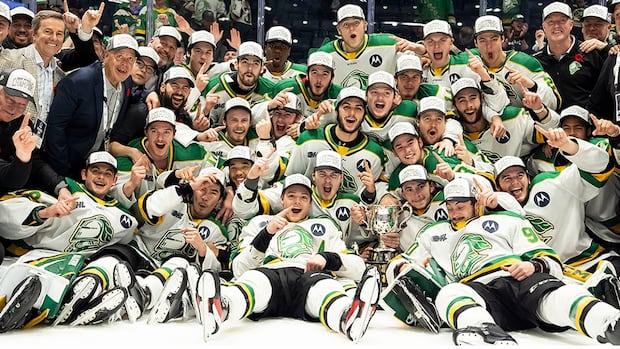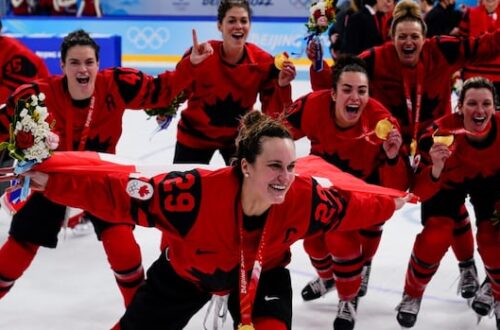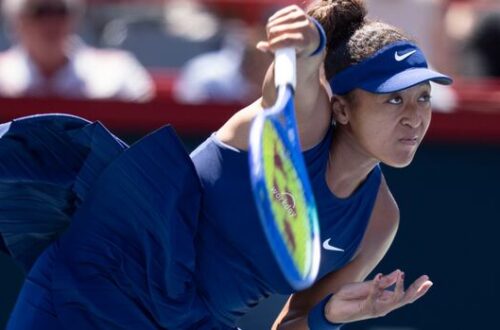A centralized team will now help Ontario Hockey League (OHL) squads enrol in the right mandatory consent and healthy masculinity training and ensure it’s completed, under a new agreement between a coalition of sex assault victim support centres and the league.
CBC spoke to parties involved in this move nearly a week after the Hockey Canada criminal trial in London ended with not guilty findings.
The OHL made gender-based violence and consent training mandatory for all major junior teams about a decade ago. The league’s Onside Program was developed for junior hockey teams by two sexual assault support centres in the province, with curriculum delivered to each team at the local level, by members of the Ontario Coalition of Rape Crisis Centres (OCRCC).
Karley Doucette is manager of education and communications at the Sexual Assault Support Centre of Waterloo Region, which is part of the team of victim support centres that’ll help oversee the Onside program.
Previously, Doucette said, completion of the training wasn’t tracked and about half of the 20 major junior hockey teams didn’t actually participate every year or took different training not developed for OHL teams.
“There have been gaps in accountability and there hasn’t been any centralized oversight, so it’s been impossible to ensure consistency and quality across the league,” Doucette said.
Importance of ‘understanding consent’
The two-hour Onside program was developed in 2008, with the OHL making it mandatory in 2016. The curriculum was distributed to OCRCC members, and each team was expected to connect with local centres, which would proceed to deliver the sessions every fall before the start of the junior hockey season.
In recent years, however, some teams and resource-stretched sexual assault victim support centres said they have had trouble scheduling the sessions, which focus on healthy masculinity, relationships, power dynamics and bystander intervention consent.
“I think it’s critical that we’re talking about this now and understanding consent, and how it’s given and all the pieces of the program,” said OHL commissioner Bryan Crawford.
The Hockey Canada trial centred on the issue of whether there was consent between the complainant, E.M., whose identity is protected under a standard publication ban, and the men, who were charged in relation to what went on in a London hotel room in 2018 when they were players on the gold medal-winning world junior team. All five were found not guilty by Justice Maria Carroccia after an eight-week trial.
That trial has started conversations that should keep going, said Crawford.
“It’s critical that we’re talking about it and understanding what consent is. There are certainly differences between legality and morality, and understanding consent and how it is given.”
Consent and Hockey Canada
The not-guilty verdict in the high-profile Hockey Canada sexual assault trial has sparked a national conversation about how we define and understand consent. As the legal system wrestles with questions around fear, coercion, and credibility, Just Asking looks at what consent really means in practice and how we can talk about it more openly. Joining us are Farrah Kahn, a consent educator and the CEO of Possibility Seeds, and Gillian Hnatiw, a Toronto-based lawyer who specializes in gender-based violence.
The Onside program links local sexual assault centres with junior teams, but some centres have had better luck getting their city’s teams to participate than others, Doucette said.
“Some teams have done the training, others have done other types of training. There hasn’t been a consistency throughout the league.”
For example, the OHL’s London Knight, this year’s Memorial Cup champions, had been in a one-hour training course with an organization not accredited to deliver the two-hour Onside program developed specifically for players.
Doucette said sexual assault centres met with the league in 2023 to propose more money for victim support centres that offer the training and a centralized co-ordination to expand the Onside program to ensure every team participated. But they did not hear back from OHL management at the time.
“This summer, we went back to the OHL and had another meeting and proposed the same things we proposed in 2023, and we’re pleased that they’ve responded and entered into a partnership with us,” Doucette said. “We will now oversee the training across the province.”
More funding for training
Sexual assault centres previously were given a $300 honorarium for the Onside training, but they said that did not properly compensate them for the staff time spent preparing and delivering the curriculum. The honorarium amount has now increased significantly, said Doucette, who would not provide specifics.
The OHL remains responsible for ensuring each team follows through with the training and schedules it with their local centre. Doucette’s centralized team will both help teams link up with the centres accredited to provide the training and track their participation.
“We’re hoping that because this trial was so publicly talked about, it will be a wake-up call,” she said.
Crawford called the changes a positive evolution of the program, and said he fully supports a more centralized oversight body to continue to tweak and make improvements.
“It helps us achieve what we all want, which is administering this really beneficial, impactful programming that makes a difference and achieves the goals that we’re setting up to achieve.”
If you’re in immediate danger or fear for your safety or that of others around you, please call 911. For support in your area, you can look for crisis lines and local services via the Ending Sexual Violence Association of Canada database.





